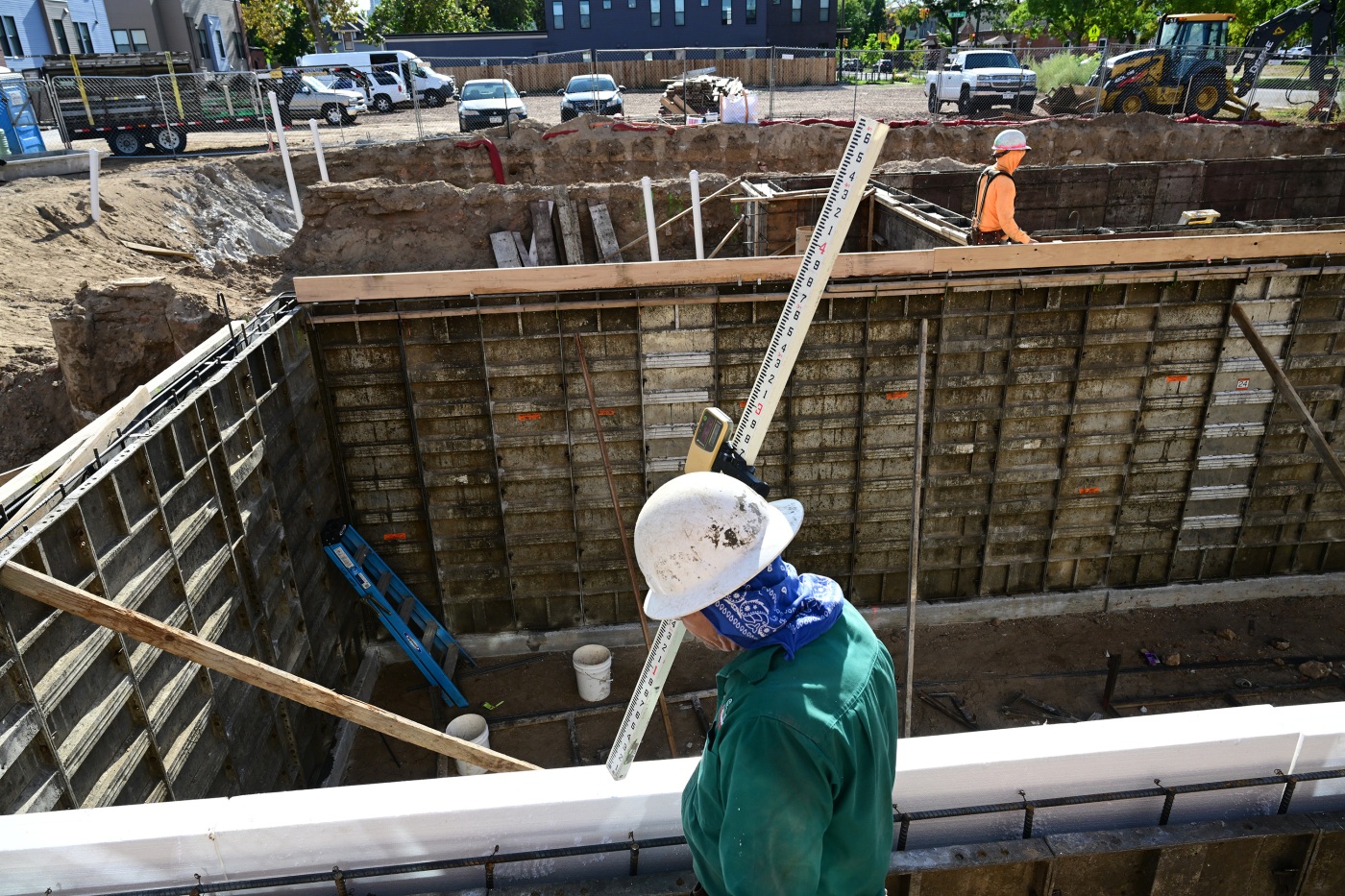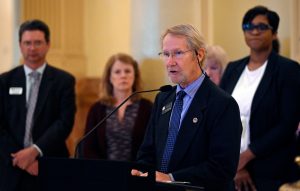Abigail Acevedo’s phone rang in February, delivering exciting news: Blocky modular units that soon would be assembled to form five townhouses — including one for her — had just been delivered to a parking lot in northeast Denver.
“I drove by just to see them, even though they weren’t ready,” said Acevedo, 28, who works as a patient access supervisor at a health clinic and has feared she might be priced out of the Elyria-Swansea neighborhood, where she’s lived for two decades. “It was amazing seeing them, just knowing that in some months, I would be able to call one of those home.”
But eight months later, Acevedo still hasn’t moved in, and the disassembled townhome units are collecting graffiti on their plastic wraps. Though the affordable housing project has seen recent movement, it was among thousands of new buildings and renovations caught in an expanding web of delays at short-staffed development review and permit offices.
Denver’s efforts to build much-needed housing, and even its residents’ attempts to make their homes more appealing, are running into delays that can last several months as the city struggles to overcome the backlogs. Development reviews for larger projects drag on for the better part of a year, pushing costs higher, while a straight-forward plan to build a new house now takes nearly 15 weeks on average to get through its first review — almost four times as long as it should under Denver’s targets.
While applicants wait, city officials say it will be months before they’re able to get a handle on the latest development trends, including a surge of residential projects that began during the pandemic.
A three-month investigation by The Denver Post found that some causes stem from self-inflicted wounds, the result of citywide pandemic budget cuts and a hiring freeze in 2020. At the time, a severe recession appeared imminent and city leaders acted quickly to reduce expenses. But they were slow to reverse cuts as city revenues — and income from permit fees — rebounded in 2021, leaving the hiring freeze in place for nearly 18 months.
The Post reviewed several years of budgets and department data. To dig into the factors behind the delays, it also interviewed planning and permitting officials, elected city leaders, people attempting to build new homes, and large-scale developers and affordable housing nonprofits, some reluctant to publicly criticize city regulators.
As the permit and review backlogs grew in 2021 and exploded this year, a resumption of aggressive hiring by the planning department has been undercut by high turnover. The city has paid $400,000 in overtime since early last year to its stretched development services division staff, which includes more than 100 employees in permitting, plan review and inspections.
It’s also used other stop-gaps, such as the recent outsourcing of some residential permit reviews to a contractor, and has tried to make its processes more efficient.
This isn’t the first time the city’s permits office has been overwhelmed during the decade-old building boom. The latest delays echo persistent backlogs that began in 2015 and took years to sort out, underlining the planning department’s difficulty in adapting quickly to development trends and other outside forces.
Laura Aldrete, the department’s executive director, says she sees hopeful signs that the worst delays are at their peaks. CPD’s goal, she said, is to achieve major backlog reductions by early next year.
“We know we have untenable delays in plan review right now, which harms our relationships with our customers and our stakeholders,” Aldrete told concerned Denver City Council members in late September during a hearing on her department’s proposed $43 million budget for 2023. It includes several new staff positions and money to help address the delays, building on earlier budget investments this year.
The development community is pushing for fixes soon.
“There’s just a lot of frustration, a lot of uncertainty,” said Albus Brooks, a former Denver City Council president who now works in development; he’s a vice president for Milender White, which has spearheaded both market-rate and income-restricted apartment projects in the city. At the same time, he said, the pace of the development recovery coming out of the pandemic, which he attributes to “pent-up demand” tied to Denver’s housing shortage, surprised him.
“In this business, you look for predictability,” he said. “And I think that’s one of the reasons we’ve got to come together with the city to find a solution to this. And I know the city’s working really hard to figure that out.”
Pandemic’s “constant uncertainty” led to cautious moves
CPD’s development services division ensures building projects in the city meet the complex residential and commercial building codes, fit within zoning rules for a given parcel, and abide by other regulations added by the City Council and Denver voters. Its work is wide-ranging and vulnerable to delays, since CPD employees also coordinate input on plans with dozens of other agencies and outside entities, from the city’s fire, parks and transportation departments to Denver Water.
During the pandemic, the department wasn’t immune from the city’s budget cuts, despite the big revenue it generates from permit and review fees — $25.5 million is projected this year, enough to cover the development services division’s expenses. The amount fluctuates based on activity.
But that money isn’t pocketed by the planning department. It goes into the city’s general fund instead, under the city’s rationale that other agencies play important roles in CPD’s permitting work.
In an interview, Aldrete defended the cautious budget decisions in 2020 and 2021, saying the pandemic posed extreme challenges. She was appointed to her job by Mayor Michael Hancock in 2019.
“We have a really open dialogue with the budget office, and I don’t feel like anyone forced us” to maintain cuts into 2021, Aldrete said. “I would characterize those last two and a half years as just constant uncertainty. So I think it’s easy for us to look back at that budget and say, ‘Was this erroneous or not?’ And I’m not sure that I would characterize it that way.”
By late last year, when the city’s receipt of substantial federal stimulus and relief dollars allowed hiring to resume, nearly 20% of the planning department’s staff had left, she said. More recently, vacancies have fallen to 28 positions, or 9% of CDP’s 300 jobs, with 17 vacancies in development services, said Laura Swartz, a department spokeswoman.
Denver is not alone in seeing permit backlogs in recent years, both among its suburban neighbors and other large cities out of state. Direct comparisons are difficult to come by, but an industry group says the city stands out locally due to the length of its delays and the sheer amount of development they affect.
“Longer permitting times directly impact the cost of housing,” the Home Builders Association of Metro Denver said in a statement to The Post. “The interest that builders carry for a project amounts to thousands of dollars per day. Every day that passes adds significant cost to homes that will have to be passed on to homebuyers and future residents.”
Residential permits face some of longest review delays
For now, the most egregious permit delays affect major residential construction, which includes new houses and duplexes — along with scrape-offs — plus home additions of at least 400 square feet. On the whole, residential projects are far less likely to see on-time permit reviews this year than commercial projects, city data show.
Cameron and Nathan Laudick have been through that gantlet, emerging with permits last month that allowed them to start construction on two new houses in Denver’s Five Points neighborhood.
The brothers began their home-building odyssey in late 2020, when they bought two cleared lots fronting Mestizo-Curtis Park on Champa Street from the Denver Housing Authority. The DHA had redeveloped public housing on the block, resulting in excess land. Habitat for Humanity of Metro Denver also bought some lots for new houses.
For more than a year, Cameron Laudick said, they faced recurring delays as they navigated first the zoning permit process, which checks city land-use plans and rules for building placement, and then building permit reviews. The lots’ location in a historic district added extra scrutiny.
They would make simple changes or corrections requested by reviewers, he said, and then wait for their resubmittals to get through weeks-long queues for sign-off.
That’s been a common experience. While the planning department says it should take permit staff four weeks to complete an initial review, actual initial review times averaged 11 weeks in late July. They grew to nearly 15 weeks as of Oct. 10, according to a city dashboard that tracks the most recent 90 days’ worth of data.
Resubmittal reviews are taking another 14 weeks on average. Just since mid-summer, the total time it takes to win permit approval has increased by 20%, from nearly 34 weeks to 40 weeks.
The Laudicks’ contractors have started foundation work for the houses, which each will have an accessory dwelling unit, or separate apartment, on-site. Though Nathan is an engineer with development experience, Cameron said it still took extra diligence to keep the permits moving.
“I would say it has been worth it, because we’ve kind of been smart and savvy with the whole thing,” said Cameron Laudick, 33, who moved to Denver from Chicago at the start of 2021 with hopes of building a home in the city. But given that construction costs and interest rates are spiking, he said, he’d be reluctant to go through it all again.
Some permit staff “feel absolutely sick” about situation
Laudick shared a complaint email he sent to a permitting official in late July, in which he noted that the delays had cost the brothers “at least $50,000 per house” from interest and other mounting expenses.
Eric Browning, Denver’s chief building official, replied by acknowledging that it’s been “an extremely long road for your project and too many others.”
“What I will do is tell you,” he wrote, “that I have teams of dedicated staff (many of whom are new hires) who take their responsibilities to heart and feel absolutely sick that we find ourselves in this situation.”
For major commercial projects, which include multifamily construction of at least three housing units as well as new offices and retail, permit wait times are less drastic. But they quickly add up, since the average project requires several review cycles.
In the last 90 days, permit reviews have averaged 6.4 weeks at intake — compared to a target time of four weeks — and 3.6 weeks for resubmittals, according to the city’s dashboard.
Before permitting, those commercial projects must go through lengthy development and zoning reviews. In the last year, city data shows it’s taken an average 41 weeks for those projects to gain approval to seek permits — where they join new queues.
In southwest Denver, developers working to transform the 72-acre Loretto Heights campus west of Federal Boulevard have been mired in prolonged site plan development reviews, said Councilman Kevin Flynn, who represents the area. So far, only the renovation of the existing Pancratia Hall into 74 income-restricted apartments is complete.
Originally, when Westside Investment Partners bought the site in 2018, it envisioned construction starting on new apartment buildings and homes in 2020, with 1,200 or more housing units built over several years. But a rezoning plan took longer than expected to win city approval. At one point, Westside expressed hope that a partner, Grand Peaks, would break ground in spring of this year.
Another partner, Thrive Home Builders, anticipated starting construction by midyear.
Neither has happened yet, even though some development plan filings date to 2020 and early 2021. Westside and Thrive declined to comment, and attempts to reach Grand Peaks were not successful.
“The delays they’ve had have added $23 million to their costs — that’s something Grand Peaks have told me,” Flynn said, expressing worry that such hold-ups are making the resulting housing less affordable. “They are in their fourth and fifth submittals with minor comments, and they’re waiting four months for signoffs on minor reviews.”
Aldrete, the planning director, said the complexity of the plans, with multiple builders, a mix of new and old buildings, and a need for new roads and utilities, has required careful reviews.
“You are converting a 100-year-old-plus campus into a new community,” she said, “which is fantastic — and we love to see the reuse. That is smart growth … but it is complex.”
Outside of big projects, contractors and do-it-yourselfers also have experienced heartburn over smaller permit reviews. The “intermediate” residential category, for small home additions, now takes an average 14 weeks for an initial review, according to the city’s dashboard. Wait times have improved significantly in recent months for the smallest category of residential projects, but it still takes several weeks on average to get a permit for a ground-level patio or a small interior remodel — well beyond the city’s two-day target.
City Councilwoman Amanda Sawyer told Aldrete during the recent budget hearing that she worried the continuing delays were spurring some residents to “make the choice to skip the permit process altogether” on home projects.
One silver lining: The long waits don’t apply to “quick permits,” which account for less than half of CPD’s permit volume and cover most roofs, water heaters, plumbing and other trade work. The city issues those quickly because they don’t require a review of building plans.
Other cities face short staffing amid surges
Other cities, including San Francisco, Seattle, San Diego and Dallas, have grappled at times during the pandemic with short staffing and backlogs in their permit or development review offices, though some have overcome them. San Diego and Dallas also have relied this year on outsourcing of some plan reviews.
Locally, several suburban cities’ permit offices told The Post that they, too, are short-staffed. Aurora and Lakewood, like Denver, are leaning on outside reviewers, too, to help keep up with demand. Review times “have been slowly trending down over the past few months but are still longer than desired,” Lakewood City Engineer Keith Hensel told The Post.
In Colorado Springs, the planning department says it’s sometimes taking longer than desired to complete development reviews amid a surge in large apartment projects.
But industry observers say that on the Front Range, Denver has developed the most glaring logjams.
“Denver has become a slower place to permit as compared to other metro area jurisdictions,” according to the Home Builders Association’s statement. It said that until 2019, when builders began noticing plan review backlogs again, the city routinely processed residential projects in just two or three weeks.
Planning officials point to one factor that helped limit the damage early in the pandemic — its transition to an online permitting system for most submissions before 2020. That ensured its permitting employees could continue operating smoothly when local government offices shut down. Some cities, San Francisco included, struggled to switch on the fly during the pandemic.
Officials point out that delays can be caused by both sides, including when applicants are slow to submit requested changes or make corrections. While they push back against some applicants’ concern that pandemic work-from-home policies have slowed reviews, they say in-person meetings can help untangle lingering issues with a permit or plan — and those recently resumed.
Andrew Fairbairn owns Service First Permits, which helps clients manage permit processes in Denver, along the Colorado Front Range and cities in California. He hears complaints from clients about Denver’s review times, but he also credits its planning department as “one of the more proactive agencies” compared to some cities that simply shrug off complaints over long review times.
Denver’s posting of average review times on its dashboard also is a rare degree of transparency.
“They really do acknowledge when they have deficiencies in staff or extra volume — and they make efforts to make improvements,” Fairbairn said.
Among those efforts: continuing overtime — including $283,000 this year — the use of former review employees as on-call staff and the planning department’s recent $475,000, three-year contract with Bureau Veritas, a consultant that will help review residential building permits.
“That’s how we’re going to be able to dig out of a lot of this — we’ve hired on a bunch of new staff and we’re using the third-party reviews,” said Robert Peek, Denver’s director of development systems performance. “Our productivity will be much higher.”
A recent process change that might have helped the Laudick brothers with their home-building permits is a tweak that gives priority in the normally first-come, first-served queue to minor resubmittals for which the reviewer only needs to verify that a simple change was made. Similar priority will be given to building plans that are waiting on one agency’s final review to win approval, Peek said.
The department projects that it will issue permits valued at $4.7 billion this year, a measure that estimates the resulting construction and labor costs. That’s the highest since 2019’s record $5.2 billion valuation, CPD says.
Through mid-September, the city logged 5,366 building permit applications, trending slightly ahead of last year — while outpacing pre-pandemic years by a third or more. But issued permits were way down, at 41,405 so far this year compared to more than 71,000 at the same point in 2019.
That in part reflects the current backlog, officials said. But it also is the result of a new dynamic: a higher share of projects are residential, and those require fewer permits per project than more complex commercial and multifamily projects.
New economic uncertainties that could affect development patterns are in the offing, with interest rate hikes already beginning to cool the housing market.
But the planning department also saw an influx of development filings for larger projects in May and June. Though not all are guaranteed to get built, concept plans for 222 projects were submitted ahead of a June 30 deadline to avoid new council-mandated affordable housing fees and set-aside requirements that took effect in July under a new inclusionary housing policy.
“I’m looking around at the 10 tower cranes in the RiNo neighborhood right now … things are not slowing down,” said Bernard Hurley, a developer whose plans for a two-phase, multi-building highrise development along Chestnut Place are in various stages of review.
So far, the review delays haven’t posed a problem, he said, though his project’s financing has taken longer than expected. Still, Hurley expressed concern that the new wave of proposals would result in bottlenecks down the line.
Townhome project points to challenges for affordable housing
As for the five townhomes in Elyria-Swansea — where Abigail Acevedo is first on the buyers’ list — the GES Coalition and its partners, including Brothers Redevelopment, are now likely just weeks away from installing the modular pieces on their foundations at Josephine Street and 44th Avenue.
The coalition focuses on housing and community initiatives in Globeville and Elyria-Swansea. Its project languished for 20 months in reviews of the concept and site development plans, precursors to obtaining building permits. The city required changes to add sidewalks, curbs and an alleyway, among other issues, and the coalition scrambled to seek help covering the costs. Its partners often went weeks without hearing anything.
Tierra Colectiva, a coalition-founded community land trust, will own the land while selling the townhomes atop it for about $200,000 to income-qualified buyers. The city in late September approved the site development plan and initial permits, ending a process that began in January 2021, city records show.
Approval came nine months after the backers, mistakenly believing they were close, organized a hopeful groundbreaking ceremony.
GES Coalition co-director Nola Miguel said the process should have gone faster, given that the homes were manufactured off-site — and because it’s a desperately needed affordable housing project in a gentrifying area. The coalition is fast approaching project milestone deadlines required by its funders, which include the city’s own Department of Housing Stability.
“It’s hard enough to be able to just acquire properties and land,” Miguel said. “Once we get into the system, we’re the same (as private developers) — it doesn’t matter that we’re an anti-displacement effort.”
But navigating the process got easier near the end, she said. That’s because the city, using money set aside in its 2022 budget, formed a review team dedicated to helping affordable housing projects — initially those entirely dedicated to income-restricted units — make it through faster.
So far, the city has assigned 19 projects to the new team, said Chris Gleissner, who oversees planning reviews for larger projects. The intent, he said, is to offer more “touch points” and closer consultation to resolve problems faster and reduce the number of review cycles needed.
“It was like night and day,” Miguel said, with the project’s final reviewer much easier to reach by phone and able to solve problems.
Still, the delays added roughly $100,000 in project costs, she estimated, requiring more fundraising. Miguel says she’s more concerned about the prospective homeowners, including several single mothers, who will pay much more in interest on their mortgages under the higher rates in effect now, compared to last spring.
Acevedo said she likely would be able to manage the higher payments. For now, she’s focused on the future — on moving in late this year or early next year, and on her plans for interior decorating. Her mom will live with her, she said, and the townhouse carries a greater significance: She’ll be the first in her family to own a home.
“I just think the outcome is going to be worth all the wait and worth everything we are going through,” Acevedo said. “I’m doing what I can to make sure that I’m ready to go once the homes do become available.”






